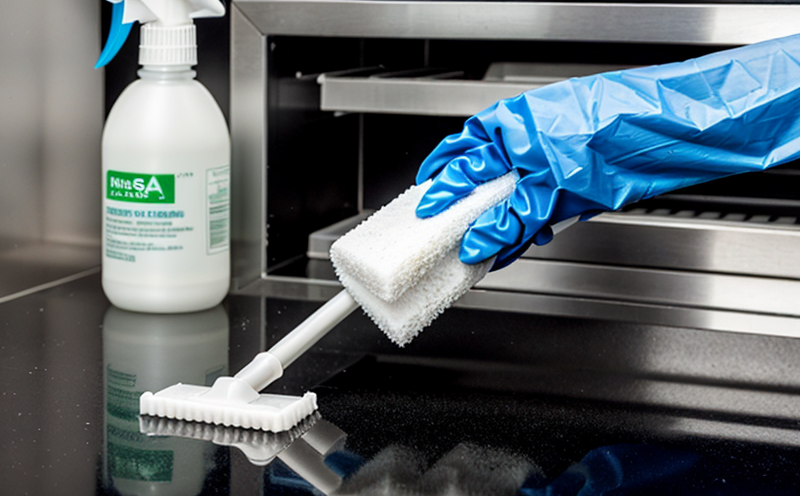EN 1500 Hygienic Handrub Testing of Plastic Dispensers
The European Standard EN 1500:2007 specifies requirements for the hygiene and performance of handrubs intended for use in healthcare settings. This standard is crucial for ensuring that products meet stringent hygiene standards, which are vital to protect public health.
In the context of plastic dispensers used for hygienic handrubs, this testing ensures that the materials used do not contribute to bacterial growth or provide any surface contamination. Compliance with EN 1500 is a key requirement for manufacturers and suppliers in industries such as healthcare, hospitality, and public facilities.
The standard applies to plastic dispensers intended for use in healthcare settings where handrub application is critical. It covers the design, material selection, manufacturing processes, and performance testing of these dispensers to ensure they meet the highest hygiene standards.
Testing procedures include evaluating the dispenser's ability to dispense the correct amount of handrub consistently, ensuring that it does not over- or under-disperse. Additionally, the plastic materials used in the construction must be tested for their resistance to microbial growth and their compatibility with alcohol-based formulations.
The importance of this testing cannot be overstated, especially given the increased focus on hygiene measures during pandemics like COVID-19. The use of non-compliant dispensers can lead to contamination risks, which is why compliance with EN 1500 is essential for maintaining public health and safety standards.
The rigorous nature of this testing ensures that only high-quality plastic dispensers are used in sensitive environments where hygiene is paramount. This includes hospitals, clinics, nursing homes, schools, and other facilities where frequent handwashing is required to prevent the spread of infectious diseases.
Our laboratory provides comprehensive EN 1500 compliance services for plastic dispensers used in hygienic handrubs. We offer testing for all aspects of the standard, including material compatibility, microbial resistance, and performance under real-world conditions. Our team of experts ensures that every detail is addressed to meet international standards.
Why It Matters
The cleanliness and hygiene of handrubs are critical in preventing the spread of infectious diseases. Plastic dispensers used for these products must be designed and manufactured with materials that do not harbor bacteria or other harmful microorganisms. Compliance with EN 1500 ensures that the products meet the highest standards, providing peace of mind to users.
- Ensures consistent dispensing volume
- Maintains hygienic conditions by preventing bacterial growth
- Meets international regulatory requirements for healthcare settings
- Promotes public health and safety in high-risk environments
The importance of this testing cannot be overstated, especially given the increased focus on hygiene measures during pandemics like COVID-19. The use of non-compliant dispensers can lead to contamination risks, which is why compliance with EN 1500 is essential for maintaining public health and safety standards.
Scope and Methodology
| Aspect | Description |
|---|---|
| Material Compatibility | The plastic used in the dispenser must be compatible with alcohol-based formulations. This involves testing the material's resistance to degradation by alcohols and other ingredients. |
| Bacterial Growth Resistance | The material of the dispenser should not provide a conducive environment for bacterial growth. Tests are conducted to ensure that no bacteria can thrive on its surface. |
| Dispensing Performance | The dispenser must consistently dispense the correct amount of handrub, ensuring user satisfaction and effective hygiene practices. |
| Stability under Real-World Conditions | Testing includes evaluating the dispenser's performance over time in typical usage conditions to ensure long-term reliability. |
The methodology for testing is strictly defined by EN 1500, ensuring that all aspects of the dispenser are thoroughly evaluated. This includes laboratory tests and real-world simulations to mimic actual use conditions as closely as possible.
Benefits
- Enhanced Hygiene: Ensures products meet stringent hygiene standards, protecting public health.
- Regulatory Compliance: Helps manufacturers comply with international regulations and standards.
- Increased Trust: Builds confidence in the quality and safety of your product among users.
- Improved Reputation: Demonstrates a commitment to high-quality products, enhancing brand reputation.
- Reduces Contamination Risks: By ensuring that materials do not contribute to bacterial growth or contamination.
- Promotes Public Health: Critical in healthcare settings where hygiene is paramount.
- Sustainable Products: Ensures long-term reliability and durability of the products, reducing waste and resource use.
The benefits of meeting EN 1500 standards extend beyond just compliance; they contribute to a safer environment for all users. By investing in this testing, manufacturers can ensure that their products are not only reliable but also contribute positively to public health and safety.





